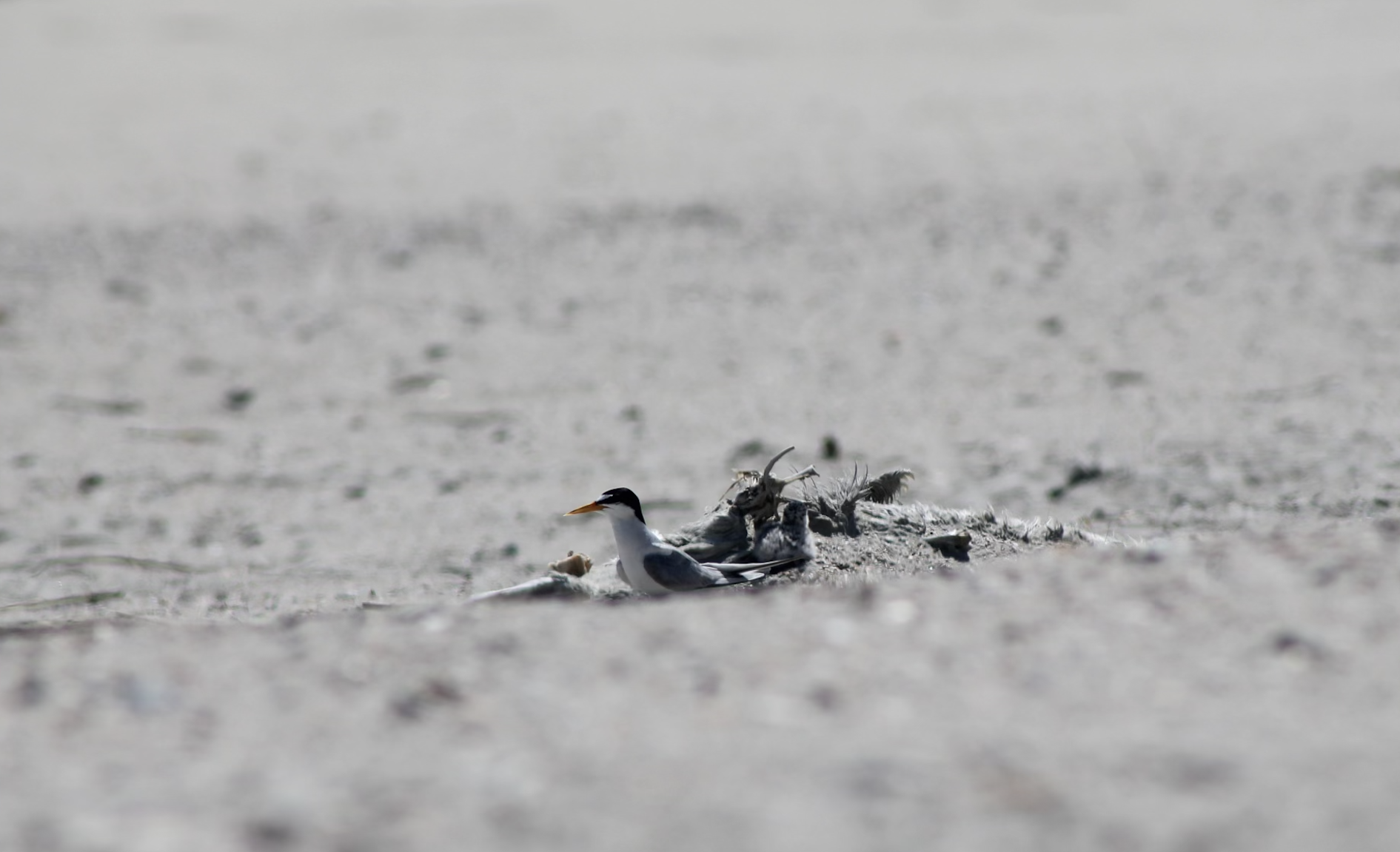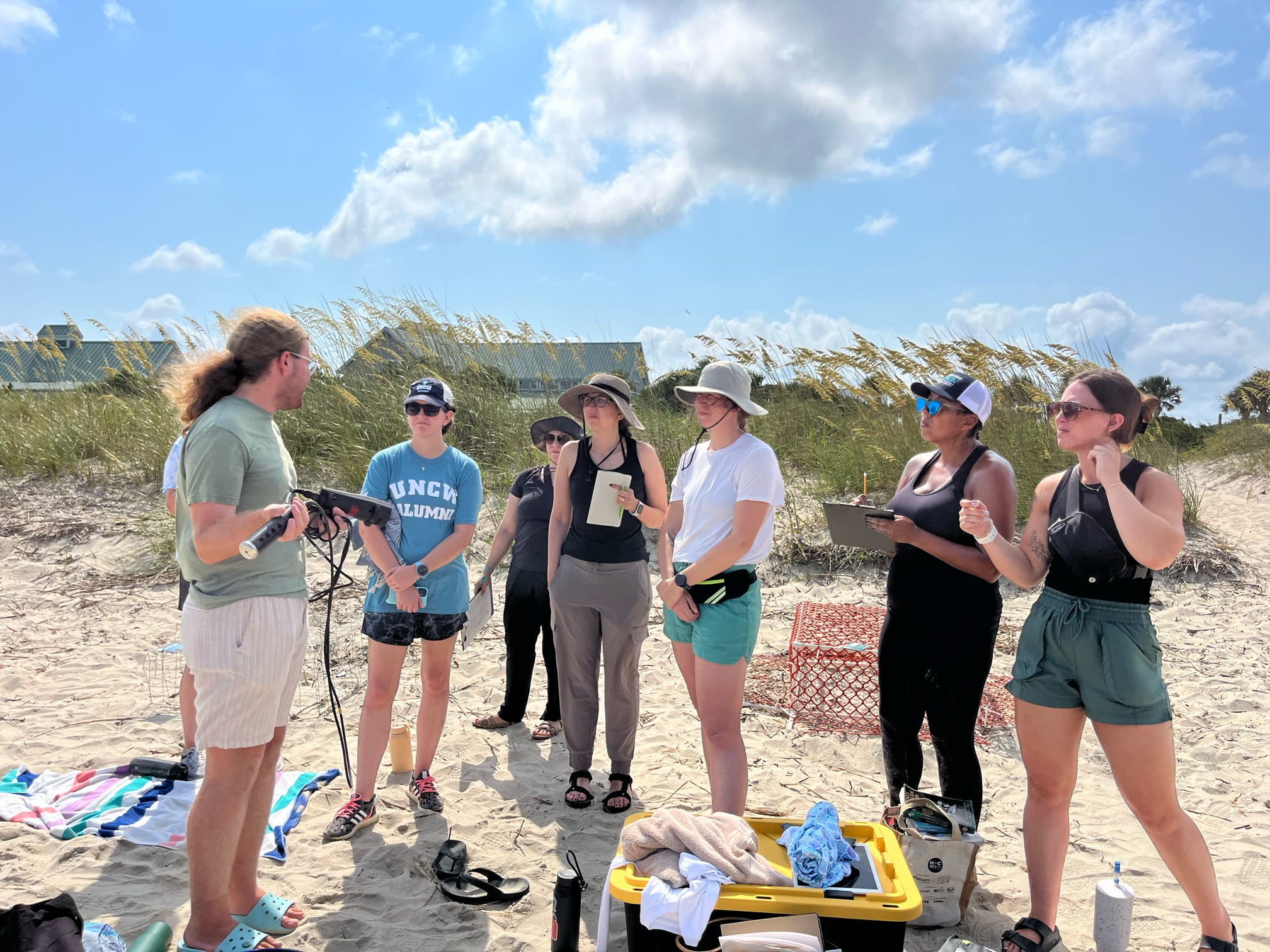Camp Rules!

By Katharine Hart, Summer 2024 Intern
Conservancy Camp is an unforgettable activity-packed week exploring Bald Head’s natural offerings. With bug and birding trips to the park, forest walks, beach day, and meeting our turtles and snakes, campers are never lost for opportunities to engage with BHI’s unique ecosystems and organisms. Each day has a theme, but our excitement to discover and learn remains the same throughout the week.
Day one of Conservancy Camp starts with name tags, North Carolina explorer journals (used for various prompted activities throughout the week like drawing animal patterns, favorite nature spaces, and sound maps), and the well-known fan favorite: a rules list. This list is co-created by counselors and campers, with raised hands offering to answer the question, “What things will make this week the best it can be, keeping us safe while having a good time?” The kids learn a lot at camp, but this activity highlights how much we learn from them, too. Below, some of our best camp rules will shed light on what guidelines can make any week the best it can be:
1. Use your listening ears
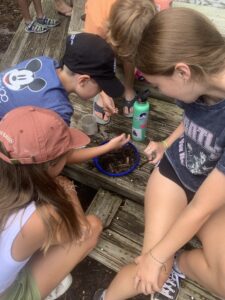 Relearning the world through children’s eyes is a beautiful gift that comes with the position of a camp counselor. Watching their growing curiosity, eagerness to learn and share, and attention spans captured easily by interesting animals, plants, and people around them helps us understand how focusing your eyes and ears on directions or a lesson can be difficult.
Relearning the world through children’s eyes is a beautiful gift that comes with the position of a camp counselor. Watching their growing curiosity, eagerness to learn and share, and attention spans captured easily by interesting animals, plants, and people around them helps us understand how focusing your eyes and ears on directions or a lesson can be difficult.
The reminder to “use your listening ears” helps us hone our focus on a single subject, a prompt that’s helpful for all age groups. When the busyness of our minds and surroundings takes precedence, we can forget to use our listening ears while engaging in conversation. Being engaged and thoughtful listeners helps us show up as better friends and improves our ability to be present with others, as well as encourages us to tune in to our auditory environment despite the ever-present noise of the moving world.
When we use our listening ears at camp, we become better learners, an application that extends beyond the Conservancy’s picnic table. (As a side note: don’t worry; morning coloring, snack time, and field trip walks are excellent opportunities for campers to share stories about their summers, the time they saw a turtle at home, and the new Inside Out movie – and we love to hear this chatter when our listening ears aren’t necessarily active.)
2. Believe in yourself
Some rules always end up on the whiteboard, even if they don’t come as suggestions from campers (like keeping our hands to ourselves and not sharing snacks). However, some ideas we add are delightful surprises that campers put forward. One example is “to always believe in yourself.” Our camper Molly shared this one with a smile, and as we recapped our rules each day of camp, it was a joy to watch this one shine through in confidence levels and unrestrained curiosity throughout the week. When we’re surrounded by so much new knowledge, it can be scary to ask questions or offer original ideas. Trying new things can be challenging, too. Self-belief is a powerful tool to conquer these fears and push beyond your comfort zone. Petting Ricky, our corn snake, during forest day and showing fellow campers nesting bird sign creations were a couple of ways campers exhibited their ability to believe in themselves
3. Believe in people
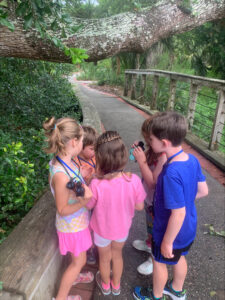 This rule was added as an excitement-filled follow-up to believing in yourself. Our campers insisted on this distinction, ensuring that support for others in addition to oneself was a guideline for the week. Sometimes, this rule can slip our minds when adventurous attitudes at conservancy camp result in rambunctiousness and actions guided by impulse, which can affect how others enjoy the day. Holding onto this belief in other people, though, encourages us to assume the best in others even when we periodically slip up.
This rule was added as an excitement-filled follow-up to believing in yourself. Our campers insisted on this distinction, ensuring that support for others in addition to oneself was a guideline for the week. Sometimes, this rule can slip our minds when adventurous attitudes at conservancy camp result in rambunctiousness and actions guided by impulse, which can affect how others enjoy the day. Holding onto this belief in other people, though, encourages us to assume the best in others even when we periodically slip up.
Beyond our camp, believing in others enforces a perspective of acceptance, forgiveness, and support for those around us. If we believe in people, our default presumptions are positive, and we can give others grace before jumping to conclusions about what kind of person they might be based on a single action. Our actions do reflect who we are, but humans make mistakes, and we become better individuals when we are granted the grace to mess up sometimes.
When others believe in us, we take risks that lead us to new places, ideas, and questions. At camp, believing in people centers us on believing in a better world, one in which we encourage others instead of immediately resorting to frustration or shutting down. When a camper raised their hand to share this rule, I can say with certainty that my belief in people was raised, too.
4. Be kind to people AND animals
This rule represents how as stewards of the environment, campers garner significant attention and care for animals we encounter and interact with. Kindness is a trait that will serve campers far beyond the Conservancy, and it is a joy to watch them foster and exhibit this characteristic with people and animals both big and small. When we bring campers to the park to go birding, our walk takes us much longer than most due to constant stops to pick up and check on roly polys. The gentleness with which the kids handle these arthropods is impressively mature. The occasional comments they make (“Be careful!” or “He’s so cute all rolled up!” or “We should probably put Fred [bug friends often get names within thirty seconds of being held] down now, he looks ready to go back”) exhibit the compassion they hold for vertebrates and invertebrates alike.
5. Be patient
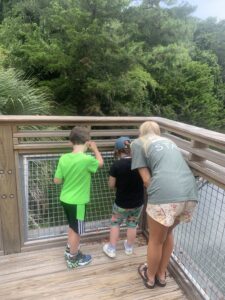 A rule we could all be reminded of every once in a while, the challenge of patience is a lesson that takes both time and mental effort. Impatience is often a product of excitement and eagerness, which we encourage in all sorts of environments, especially camp. We see this challenge arise in other programs like Kids Fishing & Crabbing, where stillness and waiting are the methods to success.
A rule we could all be reminded of every once in a while, the challenge of patience is a lesson that takes both time and mental effort. Impatience is often a product of excitement and eagerness, which we encourage in all sorts of environments, especially camp. We see this challenge arise in other programs like Kids Fishing & Crabbing, where stillness and waiting are the methods to success.
What’s so great about patience is it’s so often rewarding. Taking a few deep breaths, staying present, and considering how others might be affected by your actions are tips we offer when patience is particularly difficult. Many might be surprised by how well our campers demonstrated this skill while waiting for friends to wash their hands or before trips to the media center. As a counselor, one valuable takeaway the campers taught me was that patience can be occupied with other activities, like measuring yourself against our turtle paintings on the wall in Fleming while waiting for the bathroom.
6. Leave animals alone so that they can be happy
Created to discourage others from approaching sea turtles or picking up wild animals that like to be left alone, this rule emphasizes the importance of utilizing consent, care, and consideration to respect animals around us. This rule can be extended to other humans, too. Giving others space and needed alone time – and taking the extra step to ask and understand emotional and physical capacities – allow us to be better stewards of all of the earth’s organisms.
7. Be funny
A tip that couldn’t be left off this list, our campers brainstormed this rule while giggling about our box turtle Gloria’s impressive skateboarding skills. Easy to omit from a rules list but important nonetheless, humor can make light of numerous situations, encouraging freedom, playfulness, and glee as characteristics of nature exploration. Informal education allows children to be adventurers in their learning, deriving creativity and curiosity from lessons about the environment and the organisms within it. “Be funny” encourages children to create lasting memories that don’t restrict their joy while immersing in the activities we plan for them. Additionally, humor allows us to relate to animals more personally, connecting to them on a deeper level. It is completely reasonable to giggle while watching a turtle skateboard!
Location: P.O. Box 3109, 700 Federal Rd. Bald Head Island, North Carolina 28461 EIN#: 58-1574496
Phone: Office: (910)-457-0089
Email: info@bhic.org
Hours:
- Monday9AM - 5PM
- Tuesday9AM - 5PM
- Wednesday9AM - 5PM
- Thursday9AM - 5PM
- Friday9AM - 5PM
- Saturday9AM - 5PM
- Sunday9AM - 5PM
